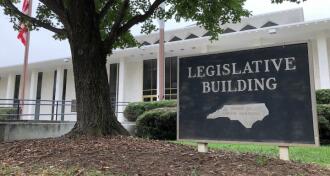Clients – whether governmental bodies or interested citizens – often ask about how North Carolina's Open Meetings Law works.
This article is intended to give a broad answer to that question by presenting the essential points that should be understood when working with public bodies and official meetings. These points are necessarily general in nature. Any specific Open Meetings Law issue should be considered in light of the actual text of the statutes and the facts involved.
The Open Meetings Law can be found in Article 33C of Chapter 143 of the North Carolina General Statutes. According to Article 33C, open meetings are important because "public bodies that administer the legislative, policy-making, quasi-judicial, administrative, and advisory functions of North Carolina and its political subdivisions exist solely to conduct the people's business" and, therefore, "it is the public policy of North Carolina that the hearings, deliberations, and actions of these bodies be conducted openly." N.C. Gen. Stat. § 143-318.9.
Anyone working with or governed by the Open Meetings Law should be aware of the following points:
The Open Meetings Law is Extremely Broad in Scope.
Every institution created by the state of North Carolina as an entity with a public purpose is a "public body" subject to the Open Meetings Law. The term "public body" includes not only the governing board of a public entity, but also all committees and subcommittees of that governing board as well. In addition, every entity created or controlled by a public body also is covered by the Open Meetings Law. Thus, even a supporting foundation that is a nonprofit corporation, but whose directors are appointed by a public body's governing board, is usually a covered public body.
North Carolina Courts Have Consistently Held That the Open Meetings Law Must be Read Liberally and Each Word Given its Maximum Scope.
Thus, the term "committee" as used in the Open Meetings Law should be interpreted to include any subcommittee, working group, panel, or other committee-type of group appointed by a governing board. This is true even if the committee or subcommittee will not make any decisions or have any power to act because the Open Meetings Law explicitly uses the word "advisory" when describing the groups subject to it. Thus, any appointed group is a committee, even if it reports only to the larger governing board.
Whether a Meeting is an "Official Meeting" is Determined Solely by the Actions of Those Present, not Formality.
This is a very important point to keep in mind, and one that has tripped up more than one public body. Even an informal gathering of a majority of the members of a public body to discuss an issue of concern to the governing board or even to just gather facts is, by virtue of the participants' actions, an official meeting subject to the Open Meetings Law. The Law even applies to gatherings that begin innocently enough but morph into a discussion about a public issue.
For example, just because a majority of the members of a governing board happen to be at the same dinner party does not make the party an official meeting covered by the Open Meetings Law. However, if those members begin to discuss an issue of concern to the governing board as a whole, they will have created an official meeting subject to the Open Meetings Law and probably will have conducted the now official meeting in violation of the Law because of the lack of proper notice (as discussed below). The fact that the members of the board or committee were there for an informal dinner is irrelevant. While it may seem impolite to shut down a conversation that may have begun quite innocently, it may well be the prudent thing to do.
Meetings of Professional Staffs and a Minority of Members of a Public Body are not Subject to the Open Meetings Law.
Meetings of committees composed entirely of professional staff held in the normal course of their work are not subject to the Open Meetings Law. Likewise, a discussion among a minority of members of a governing board or a committee is not an official meeting and, therefore, is not subject to the Open Meetings Law.
Official Meetings Must be Preceded by Proper Notice.
It is especially important to avoid creating an official meeting by accident, such as might have happened in the hypothetical dinner party discussed above.
Proper notice can take different forms depending on the facts, but any notice must state the purpose for the meeting. The purpose can be broadly worded, but it must have some topical reference. For example, "to discuss policies" would not be adequate, but "to discuss personnel policies" would be adequate.
Regular meetings can be noticed by posting the meeting dates on the governing board's bulletin board and website, and must be given to all media outlets that request notice. Thereafter, the regular meetings would not need additional notice if they are held at the time set out in the original notice.
However, if there is not a regular schedule, or if a regularly scheduled meeting needs to be changed, then notice of the new or rescheduled meeting must be: (a) made at least 48 hours in advance, not including weekends and holidays; (b) posted on the bulletin board or at the meeting room where the meeting is, or had been, scheduled, and on the entity's website; and (c) given to all media outlets that have requested notice of meetings.
A properly noticed official meeting can be recessed to another time and place without further notice. This "recess" requires precise parliamentary procedures to be followed, but it can be a useful tool for changing meeting locations or continuing a meeting that needs to span across several days.
The "Emergency Meeting" Exception has Limited Usefulness.
Sometimes there is a need for an emergency meeting that cannot wait for the required 48 hours after public notice is given. Nevertheless, in the event an emergency meeting is required, the public notice of the meeting must be given as soon as possible to media outlets that have requested to be notified of meetings.
However, the courts apply a strict interpretation to the term "emergency." "Emergency" meetings are limited only to meetings that must occur before the 48 hours notice requirement can be met. Thus, an emergency is not the same thing as an inconvenience. In addition, waiting until the last minute or creating an urgent and looming deadline where reasonable foresight could have avoided the time crunch will not create an emergency.
Any Decisions Made at a Meeting Held in Violation of the Open Meetings Law Can be Declared Invalid by a Court.
Any actions or decisions taken at a meeting held in violation of the Law can be invalidated. Even actions eventually approved during a proper official meeting that nevertheless rely on deliberations taken, or discussions held, in a meeting that violated the Law can be invalidated. Therefore, an informal "caucus discussion" – no matter how spontaneous or informal – that is not properly noticed and involves a majority of a governing board or a committee (such as occurred at the hypothetical dinner party above) can result in the invalidation of subsequent actions taken at a properly noticed public meeting.
Members Face Potential Personal Liability for a Violation of the Open Meetings Law.
Meetings held in violation of the Open Meetings Law do not carry any civil or criminal penalties for the participants. However, holding meetings that violate the Open Meetings Law could be found by a court to be a breach of the participants' fiduciary duty to the public body. In addition, in some instances, the persons making a decision and taking an action in violation of the Open Meetings Law might be held personally liable for any costs incurred as a result of the invalidated decision or action.
Conclusion
The Open Meetings Law is not usually a friend of efficiency. But the General Assembly and the courts have consistently decided that transparency and public involvement in the governmental decision-making processes are much more important than the efficient operation of a public body. All members of a "public body" must take care not to allow a situation to develop what could result in a violation of the Law.
© 2011, Ward and Smith, P.A.
For further information regarding the issues described above, please contact James W. Norment.








